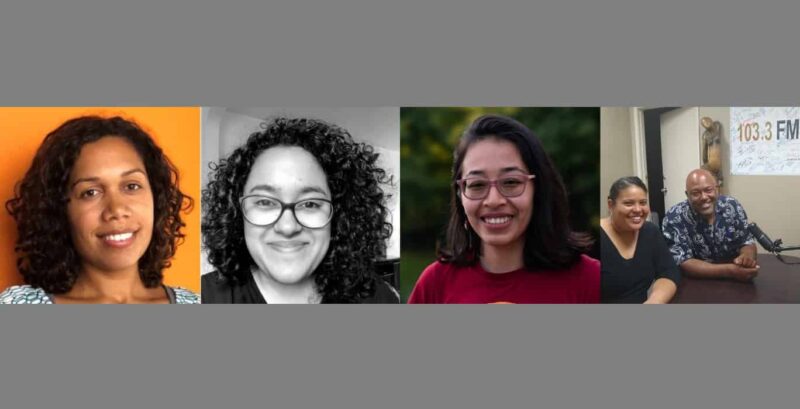Newsrooms are being pushed to confront their lack of diversity and grapple with ever present sustainability issues, and journalists around the US continue to cover BLM protests and the COVID-19 pandemic all the while wondering if they’ll have a job tomorrow.
In a new podcast, the Listening Post Collective, an Internews project, highlights how local media in the US are navigating this complicated time by featuring Nicole Pritchard from the Irvine Foundation, Cicero Independiente’s April Alonso and Irene Romulo, and Fresno based journalist Jamila Harris.
A funder supports racial equity and recession resilience in California
Nicole Pritchard is Program Officer for the James Irvine Foundation, which has funded some Listening Post Collective projects. Like many of us, she is feeling anxious about COVID-19 and the issues around racism. But she also has hope.
“I’m feeling inspired by the young people that are stepping up and leading the way forward. And I’m feeling hopeful that maybe now enough people are ready to change the world. Because now is the time when we need to build a new economic system and a new society that benefits all residents.”
Nicole also sees the need for more philanthropic support for journalism. “I think more and more foundations are seeing journalism as a public good. As something that needs to be supported in order to improve civic society.”
She had some advice for small newsrooms that are looking for support. “If small news outlets are able to establish 501(c)(3) nonprofits, that makes it easier. I think larger foundations typically make bigger grants to bigger organizations. So, reaching out to community foundations, family foundations might be a good first step for smaller media outlets. I think also collaborations are important where possible.”
Addressing the information needs of Spanish speakers in Cicero, Illinois
April Alonso and Irene Romulo started Cicero Independiente, a volunteer-run, bilingual, independent news outlet for Cicero, Illinois residents, when they noticed that there was a lack of news coverage for the majority Spanish speaking population, and a lack of accountability and transparency about the decisions made by the local government. Cicero Independiente is a member of the Listening Post Collective.
“We’ve focused a lot on writing stories from holding our local government accountable to informing community residents about the coronavirus and where to get services, where to get tested,” said Irene. “And we’re also doing stories where we highlight the great things that community members here in Cicero are doing. And all of our stories are bilingual.”
Cicero Independiente also recently started a fellowship program for young people of color who are interested in journalism to get them involved in telling their own stories and getting information into the community.
“We are people who are living in the community that we’re writing about. And how our neighbors are being impacted by COVID-19 and the environmental injustices that have increased the risk for people living here. We’re affected by that as well as are our family members.” Irene wrote an op-ed for the news site addressing the myths of why Latinx people are experiencing higher rates of COVID-19 in Cicero.
At the same time, April was working on highlighting people from the community, especially young people who are graduating this year and have had to cancel their graduations. Many of them were the first people in their families graduating from high school. “It’s definitely part of us wanting to keep a balance and recognizing that our community deserves to have more of an accurate portrayal of who we are, and that we care about different things.”
Changing the narrative around Black people’s lives in Fresno
Jamila Harris is a local journalist, educator, podcaster, and radio personality who works at KOFP, a black-owned radio station in Fresno, CA. She was involved in the Listening Post Collective’s information ecosystem assessment in Fresno. Jamila gets news items mostly from citizen journalists. She is trying to counteract some of the narratives about the current BLM protests.
“One is the narrative of Black on Black crime. It’s a deflection from the real issues that we’re talking about, number one. Number two – most of the time those people are prosecuted to the fullest extent of the law when it’s a quote Black on Black crime. We’re talking about those people [police] who unjustly kill people and then they’re not prosecuted.”
Jamila supports community and citizen journalism because she feels that it personalizes issues and that the audience can empathize more when they recognize the background.
“It’s not a them thing, it’s a we thing. I’m happy to see a lot of people stepping up to the challenge, a lot of people voicing their opinions, a lot of people getting involved. Beyond that, I would hope that during this time, people will use this as an opportunity to gain more knowledge, gain more insight, be more empathetic, show more love to people.”
